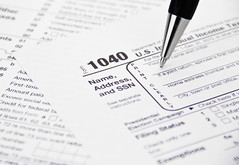 IRS 1040 Tax Form Being Filled Out (Photo credit: kenteegardin)
IRS 1040 Tax Form Being Filled Out (Photo credit: kenteegardin)Different due date for return
Ordinarily, your tax return is due April 15. However, this year the deadline has been extended to April 17. The reason: April 15 is a Sunday and April 16 is the Emancipation Day holiday in Washington, D.C. If you file for an extension, you have until Oct. 15, 2012, to file your return.
New tax form for capital gains and losses
The Internal Revenue Service has created a new form, Form 8949: Sales and Other Dispositions of Capital Assets, that most people will have to use to report their capital gains and losses. Then, you report certain totals from that form on Schedule D of your Form 1040.
Two standard mileage rates
If you use the standard mileage rate to deduct your business driving, be aware that there are two different rates for 2011. The rate is 51 cents per mile for all the business driving you did from Jan. 1 through June 30, and 55.5 cents for the rest of the year.
Medical and moving mileage are both 19 cents per mile for the first half of the year and 23.5 cents in the second half.
Self-employed health insurance deduction
Self-employed people are allowed to deduct 100 percent of their health insurance premiums from their income tax (you take this deduction of line 29 of Form 1040). In 2010, the self-employed were also allowed to deduct their health insurance premiums for self-employment tax (Social Security and Medicare) purposes, as well as income taxes. This deduction is no longer allowed -- don't look for it on the 2011 Schedule SE that you file with your Form 1040 to pay your self-employment tax.
Alternative minimum tax (AMT) exemption amount increased
The AMT exemption amount has increased to $48,450 ($74,450 if married filing jointly or a qualifying widow(er); $37,225 if married filing separately).
Health savings accounts
If you have a health savings account (HSA) and withdraw money from it to pay for something other than medical expenses, you are required to pay a penalty tax on the withdrawal. In the past, the penalty tax was 10 percent.
Starting in 2011, however, the penalty tax is 20 percent. In addition, beginning in 2011, you can't buy nonprescription drugs with HSA money.
Roth IRAs
If you converted or rolled over an amount from a traditional IRA (individual retirement account) to a Roth IRA or designated Roth in 2010, and did not elect to report the taxable amount on your 2010 return, you generally must report half of it on your 2011 return and the rest on your 2012 return.
Mailing a return. The IRS changed the filing location for several areas. If you're mailing a paper return, be sure to check the Form 1040 instructions for the correct address.

No comments:
Post a Comment